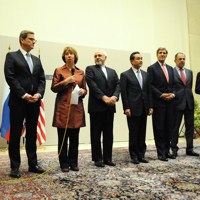The ink was not dry on the agreement that the United States and its five partners signed with Iran over the weekend before criticism exploded. Israeli Prime Minister Benjamin Netanyahu called it "a historic mistake," while his economic minister, Naftali Bennett, said, "If five years from now a nuclear suitcase explodes in New York or Madrid, it will be because of the deal.” Former U.S. diplomat John Bolton called it "abject surrender." And all of this is just the opening round: During the coming weeks there will be an outpouring of attacks on the agreement.
The freshly signed deal is not intended to be permanent or final. Nor is it a decisive win for the West. At best it is a tentative first step toward diminishing the threat that Iran poses to its region. Even so, much of the criticism is uninformed by the history of strategy or chooses to distort it. What the Iran issue desperately needs is cold realism to overcome four delusions that are playing a malignant role in the debate.
One is that the current sanctions are keeping Iran from increased aggression. If the sanctions are lifted or even softened, according to this thinking, Iran will quickly develop atomic weapons and use them to attack Israel or as a shield allowing increased support for terrorism. This argument has emotional appeal, but there is little evidence or logic behind it. Iran's leaders know that a nuclear attack on Israel would result in annihilation, and there is absolutely no indication that the regime is committed to national suicide. Iran does not have the ability or the motivation to undertake conventional aggression against major regional states like Israel and Saudi Arabia. It has no incentive to increase its support for terrorism beyond what it currently does, and there is no indication that the sanctions have limited its ability or willingness to support terror. If sanctions have not caused Teheran to stop supporting Hezbollah so far, there is no reason to believe they will in the future.

